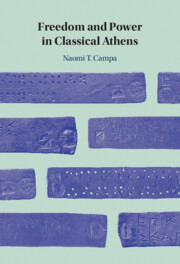Acknowledgments
One incurs a great many debts while writing a book, especially one that began long ago in the form of a dissertation. Accordingly, my acknowledgments can only approximate completeness and concision.
I first discovered that classics was an intriguing, interdisciplinary field with which to engage pressing questions of our own time at New College of Florida, a college whose raison d’être was to encourage student investment in their education and to provide the academic freedom to pursue it. There I did “whatever I wished” with a purpose, and I am a better scholar and citizen for it. I begin with thanks to my two classics professors there. John Moore introduced me to the wonders of Greek and allowed my curiosity to dictate what difficult texts I attempted to decipher. May he and his boisterous laugh rest in peace. The deeper debt of gratitude is to David Rohrbacher, who has read too many of my pages in all stages of drafting for twenty years, if either one of us can believe it. Although he probably would have preferred if at some point I had begun to refrain from subjecting him to the most preliminary of drafts, he has steadfastly advised me throughout my career, reading even this manuscript end to end more times than anyone else except me.
I am likewise indebted to my mentors from graduate school, whom I am lucky enough also to count as friends. Ruby Blondell taught me how to scrutinize the Greek language and how to write expository prose. Let no remaining split infinitive, unnecessary adverb, or obfuscating syntax suggest otherwise. In urging me to refine my writing, Ruby sharpened my logic, clarity, and creativity; in short, she made me a better scholar at every turn. Deborah Kamen has been an unceasingly supportive force. She has the marvelous ability to get me to work out the knotty bits in my thinking through conversation, even when I have found an inconvenient time for that conversation. I have come to realize that she has often helped me in ways I was not fully aware of until later. While my work differs from Ruby’s and Deb’s own, this book undeniably bears their stamp. I hope these brief encomia reveal the sincerity of my gratitude.
The development of this book after its inception in graduate school was aided by many individuals and institutions. Early in my career, an Andrew W. Mellon Postdoctoral Fellowship at Oberlin College eased me into the life of a professor. The origin of this book as a book and not a dissertation began there. Kirk Ormand, Chris Trinacty, and Drew Wilburn taught me by example how to be a good colleague and professional scholar. Chris’ guidance remains indispensable. The department also supported my participation in the Faculty Success Program at the National Center for Faculty Development and Diversity, where I learned to protect time for writing.
I have also benefited from audience comments at several conferences. Even more so, as panel respondents or simply as generous colleagues, many other people have read parts of the manuscript and given helpful feedback, or have engaged me in thought-provoking conversations over the material. My thanks to Daniela Cammack, Mirko Canevaro, Allison Glazebrook, Kostas Kapparis, Peter Liddel, Josh Ober, Daniel Schillinger, Joel Schlosser, and Carl Shaw. An especial thanks to Ashli Baker, for all manners of feedback, advice, and friendship.
My writing group, composed of Curtis Dozier and Sergio Gutiérrez Negrón, has provided me with regular accountability and the urgency to keep pressing forward. They have shared in plenty of commiseration and celebration.
I am grateful to Benjamin Moon-Black and Zoé Elise Thomas, who have proofread, wrangled bibliography, and done the myriad other tasks that bring a manuscript to completion, and to Pam Scholefield, who expertly created the indices. These individuals significantly lightened my load so that I could work on the writing and often improved the final product.
A generous fellowship from the American Council of Learned Societies (ACLS), supplemented by my home institution, the University of Texas at Austin (UT), gave me the necessary gift of time to finish the book. I feel honored to be counted among ACLS fellows and fortunate to have had the year to dedicate to writing. The Department of Classics at UT has provided a supportive and friendly environment even in the midst of a pandemic. In particular, Deborah Beck has constantly and cheerfully steered me toward my priorities and Michael Gagarin has graciously shared his time in reading the manuscript in its entirety and treating me to regular conversations over lunch. At Cambridge University Press, Michael Sharp has been invaluable in shepherding me through the process from proposal to book. The detailed and thoughtful reports from the two anonymous referees in no small way helped me strengthen the final version. Parts of Chapters 1 and 2 appeared in an early form in Polis as “Positive Freedom and the Citizen in Athens” (2018), since developed and expanded. I thank the editors of the journal for letting me reuse the material.
Last but not least, a thank you to Molly T. Campa, for all of it. And Amos and Edgar for the rest. Thank you. We did it. Finally.
